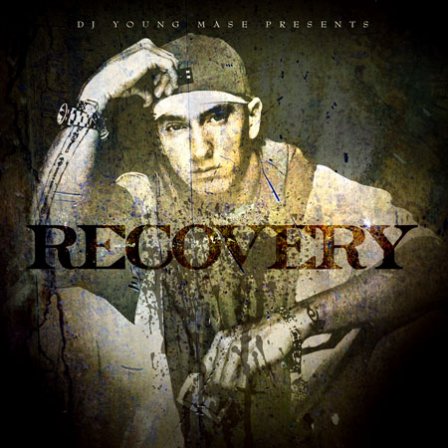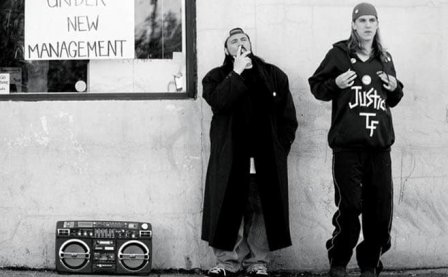Although it happened just a few weeks ago, I have a feeling that listening to Recovery for the first time is something I’ll long remember. Sitting in the passenger seat of my best friend’s car sometime around 2 AM, surrounded by open road and windows, I popped the freshly burnt CD-R into the tray with tired anticipation. The album had just leaked earlier that day, and though we felt spent after some eight or nine hours in the studio recording our own stuff, waiting till tomorrow for new Em was out of the question. We burnt down the empty highway with the speakers up full blare, toward the city but with no destination other than the end of the disc.
A year and some months prior, I had a similar experience at a similar hour in that same leather seat. It was a few weeks after my friend had returned from rehab, and before that a somewhat brief but very passionate tryst with hard drugs. We were still in the process of getting reacquainted with one another, and as we drove around the dim and deserted backroads, he decided to show me the Eminem song “Drug Ballad.” Ever since middle school (and without much thought), I had long dismissed the rapper as something of a bigoted idiot; but I really listened that night, and what I heard was evocative, moving, brilliantly written and rhymed, the unmistakable sound of a unique mind at work. In an instant, I felt like I understood. I’d never done a drug in my life, and yet in the midst of that song I felt I could truly understand what it meant to be an addict.
Needless to say, I was hooked. I delved into Eminem’s first three albums and found that their contents stimulated me in ways no other music had done before. Everything seemed to have a fascinating duality to it: the alternately flippant and teeth-gritted condemnations of his deadbeat dad and abusive mom; the highs and hangovers of a man with an insatiable drug-hunger; the love/hate odes and violent fantasies about his ex-wife Kim; the tearful pride and fearful anxiety of a father raising a baby girl through personal hell; and on and on. All delivered with virtuosic panache and an infectious can’t-give-a-fuck demeanor, over brilliant beats (frequently produced by Em himself or mentor Dr. Dre) and through any of three alternating egos (rap superstar Eminem, regular guy Marshall Mathers, or pill-popping cartoon villain Slim Shady — though the blurring lines between them added compelling questions of narrative reliability). Sure, the abundant misogyny and gay jokes were there like his many detractors bewailed so often and loudly, but I felt like a bit of close attention was all it took to realize they amounted to a sharp satire of Em’s trailer hick upbringing more than anything else. After all, the guy had written some of his best songs about being misunderstood by the world at large (“The Way I Am,” “White America”), but seemed most sincerely troubled by the way his own fans often seemed to miss the point (“Stan”). Despite Eminem’s record-breaking popularity, I felt like I had forged a rare connection with him as one of the few listeners who really got the full picture.
I had the same feeling listening to Recovery that night, but for all the wrong reasons. The die-hards — let down by 2004’s stained and spotty Encore, and the putrid rape/murder fantasies of last year’s embarrassing Relapse — were already sounding the fanfare of a second coming, and soon the press would find heavily qualified ways to praise the record (tellingly, the Metacritic pull-quote from Entertainment Weekly’s top-scoring rave reads more like criticism than anything else). But they were all wrong. Even the pans written by those with heads and ears clear enough to hear that this record sucks haven’t quite managed to pinpoint the deepest reason why.
So let’s put it simply: With Recovery, Eminem has misunderstood everything that once made him great as thoroughly as anyone else ever has. Excuses, apologies, and promises to the fans are perhaps the record’s biggest lyrical theme, but it’s all for naught — far more painful than reassuring, in fact — when the music itself is so bad. Em’s always had a good ear for picking beats he’d know how to use, but here he second-guesses himself and tries to fit in with some of the day’s biggest hitmakers (Jim Jonsin, Just Blaze, Boi-1da): a dubious move that plays out far worse than anyone could have imagined. Generic and lifeless, these beats sound at best like a Linkin Park side project, often sterilized further by a bevy of anonymously awful guest vocalists. And when Em tries to sing the hooks himself, you’re actually left missing the damn faceless hacks; I’d like to know just what the fuck was he thinking when he laid down that atonal, Yellowcard tribute of a chorus for “You’re Never Over.” Despite Eminem’s claims to have recently reviewed his 1999-2002 records for inspiration, Recovery sounds like he wound up cribbing notes from whatever else was on the radio back then instead.
True, Eminem’s put a ton of focus back into his metrical patterns and rhyme schemes, and they’re almost back to where they were in his heyday. But all that technical skill used to be in service of great songwriting, and that’s now in even scarcer supply than ever before. Fact is, everything Eminem does on this record he’s done before, and several exponents better: drug addiction woes (“Drug Ballad,” or even last year’s “Déjà Vu” and “My Darling”); fear of being a shitty dad (the voice-cracking catharsis of “When I’m Gone”); boasts of pop music dominance (“Without Me”) and nihilist indifference (“Just Don’t Give A Fuck,” “Still Don’t Give A Fuck”); and even missing his best friend Proof (2004’s prophetic “Like Toy Soldiers” may have predated his murder by more than a year, but remains a far more moving in memoriam than anything since). Recovery’s greatest and sole redeeming moment, “Love the Way You Lie,” is an exploration of spousal abuse that exploits gorgeously its Rihanna-sung chorus. But dig up the old Encore outtake “Love You More” and you’ll discover that even that’s something Em’s already done far more powerfully on his own.
Worst of all, though, is when the lyrics of Recovery don’t just impotently suggest past triumphs, but actively negate them. “So Bad” all but nullifies Em’s seething indictment of his father’s abandonment on classics like “Cleaning Out My Closet” and “Say Goodbye Hollywood” (“The worst fear I had was growin’ up to be like his fuckin’ ass”), as he brags: “I must have got my pimping genes from him, the way he left my mama/ I’m a rolling stone just like him.” The record’s also bookended with songs that take cheap shots at Elton John (“Cold Wind Blows” and the hidden track), tainting the memory of their historic 2001 Grammys duet on “Stan” for no ostensible reason. And most damagingly, the hideous “W.T.P.” finds Eminem fully embracing the white trash culture he once so masterfully lampooned — which maybe isn’t surprising, as homophobia and misogyny prove elsewhere on Recovery to be the two addictions he just can’t quit. Perhaps the hick satire has just been plain hick all along.
That’s what hurt the most listening to this record, that first spin or any other. However confused and misguided, the effort expended is certainly palpable, and it’s heartbreaking to hear Em sincerely promise “The new me’s back to the old me” amidst a 77-minute terrorist attack on his legacy. For the average listener, Recovery will prove to be a very stale and disposable record; for the discerning Eminem fan, a sad and unwitting betrayal.
More about: Eminem




